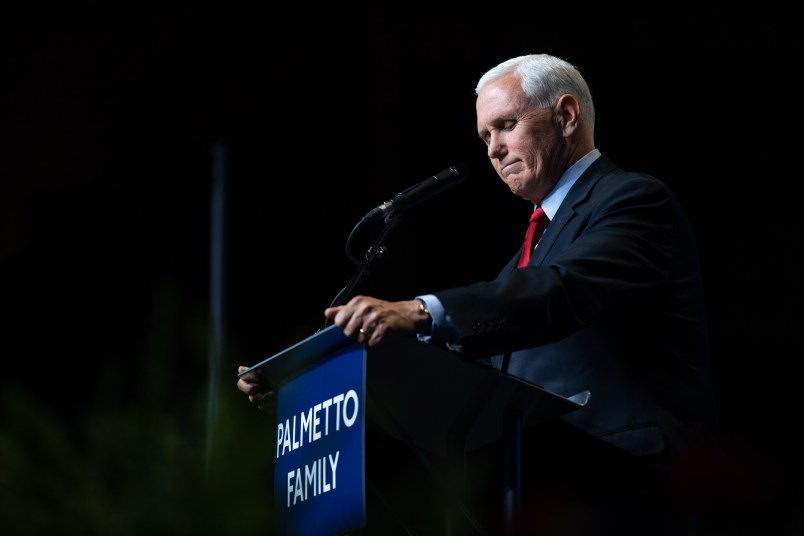A former federal judge on Tuesday night pulled back the curtain on the crucial early January days when Vice President Mike Pence was deciding whether or not to steal Donald Trump a second term.
Pence, in the days before the Jan. 6 certification of Biden’s Electoral College victory, had been pressured by Trump to listen to John Eastman, a conservative lawyer who’d written a memo arguing that Pence could take the counting process into his own hands and simply ignore certain states’ votes, among other options.
But Pence sought out his own advisors as well, reportedly including former Vice President Dan Quayle. He was also advised by Michael Luttig, a former judge who served on the Fourth Circuit Court of Appeals for 15 years, until 2006, Luttig said Tuesday night.
In a Twitter thread, the former judge recalled a blunt piece of advice: He told Pence, he said, that the vice president “had no choice on January 6, 2021, but to accept and count the Electoral College votes as they had been cast and properly certified by the states.”
“I believe(d) that Professor Eastman was incorrect at every turn of the analysis in his January 2 memorandum, beginning with his claim that there were legitimate, competing slates of electors presented from seven states,” Luttig added, saying that he’d been “honored” to advise Pence.
I believe(d) that Professor Eastman was incorrect at every turn of the analysis in his January 2 memorandum, beginning with his claim that there were legitimate, competing slates of electors presented from seven states;
— @judgeluttig (@judgeluttig) September 22, 2021
The Eastman memo was first reported by the Washington Post journalists Bob Woodward and Robert Costa in their book “Peril,” and the document itself was subsequently published by CNN. CNN later published a separate, six-page memo from Eastman that laid out his theory in more detail.
The memo stated that “7 states have transmitted dual slates of electors” in the presidential race, but that wasn’t true. As The New York Times observed in December, “a group of people who gather in a room and claim they are electors, as state-party-backed Republicans did in a few states on Monday, have no more authority than if the people reading this article decided that they, too, wanted to be members of the Electoral College.”
Eastman told the Post in a statement published this week that his memo merely “explored all options that had been proposed.”
But the memo’s assertion about dual slates wasn’t its only error, Luttig said.
Pence also didn’t have the authority to “unilaterally” decide to simply not count the votes from certain states, he added, nor could he decide “himself” that the Electoral Count Act of 1887 is unconstitutional.
to his determination that the VP himself could decide that the Electoral Count Act of 1887 is unconstitutional
— @judgeluttig (@judgeluttig) September 22, 2021
Eastman’s memo claimed not only that declining to count the votes from seven states was an option for Pence, but also that Pence needn’t ask permission from Congress or seek guidance from courts.
“The fact is that the Constitution assigns this power to the Vice President as the ultimate arbiter,” he wrote.
In Eastman’s lengthier six-page memo, he envisioned a scenario in which Pence tallied states’ votes and “determines on his own which is valid, asserting that the authority to make that determination under the 12th Amendment, and the Adams and Jefferson precedents, is his alone (anything in the Electoral Count Act to the contrary is therefore unconstitutional).”
Luttig went on step-by-step, picking apart Eastman’s assertions that Pence could act without Congress or the courts to steal Trump a second term.
“I believe(d) the Supreme Court would have decided each of these issues had they been presented to the Court, which they undoubtedly would have been had the VP proceeded as outlined in the January 2 memorandum,” the former judge wrote.
I believe(d) the Supreme Court would have decided each of these issues had they been presented to the Court, which they undoubtedly would have been had the VP proceeded as outlined in the January 2 memorandum.
— @judgeluttig (@judgeluttig) September 22, 2021







The Constitution is worth reading once in a while.
Great piece; thanks. Maybe this is a bit OT, but in the discussion of how Bushism led to Trumpism: How far is it to travel from John Yoo, to John Eastman? The lawlessness has been present for some time now.
Pence ignoring the Eastman memo and Trump’s pressure may have been the only action he took as VP that displayed any integrity. Mind you, I wouldn’t vote for him if he ever ran for office again, but credit where credit is due.
Thank Mother for that.
That this could even be stated by a ‘professor’ of law much less sufficiently entertained by a Vice President to request counsel tells me we have, even after the extraordinary excesses and insanity of the Trump years, not yet reached the pinnacle of Bullshit Mountain.